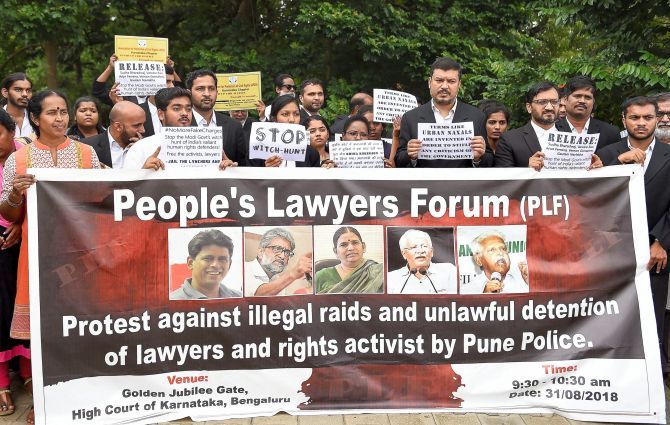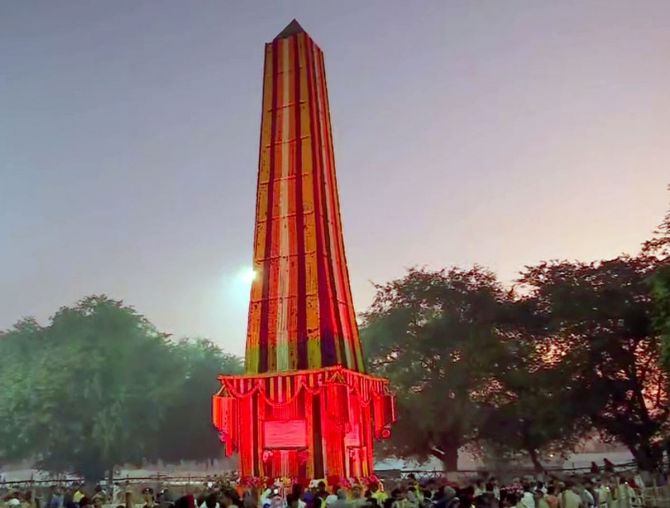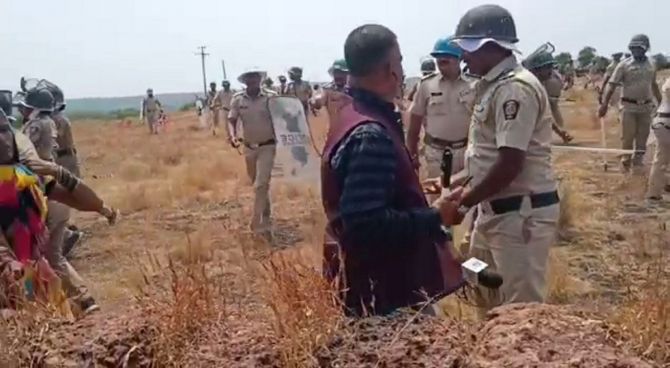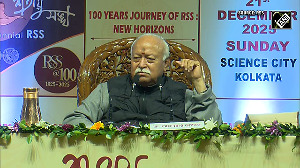'Today we know of many X, Y, and Z persons as urban Naxals but can we call these people as such? No, we cannot because we don't have a legal framework for doing that.'

"In a democracy the rule of law is supreme and we can't just arrest anybody calling a person 'Naxal' or 'Maoist'," Sandip Patil, inspector general of police, anti-Naxal operations, tells Prasanna D Zore/Rediff.com about how the provisions of the Maharashtra Special Public Security Bill, 2024, will help the state government deal with urban Naxalism and the safeguards that this bill provides against illegal action against innocent citizens.
- Part 1 of the Interview: How Maharashtra Plans To Prosecute 'Urban Naxals'
Who appoints the members of this advisory board?
Just like other Constitutional bodies, the state government will do it (appoint the members of this advisory board).
Wouldn't that lead to charges of bias?
Who appoints (the members of) National Human Rights Commission and (members of) State Human Rights Commission? Isn't it the government? People have faith in these commissions then this commission (the advisory board that has to approve the Maharashtra government's ban of an organisation as an unlawful organisation) will also have the trust of the people of the state.
How many 'unlawful organisations' -- that would fall under the purview of the Maharashtra Special Public Security Bill, 2024 -- are under the radar of the Maharashtra police?
As per the data we have till today (July 17, 2024) there are about 64 such organisations, 34 of which are quite active organisations.
There are fears among civil rights activists that anyone and everyone can be termed an urban Maoist under the provisions of this proposed law. How do you tackle questions related to misuse of this proposed law?
This Act will help define an 'unlawful organisation' and not 'unlawful individual'. If one is a member of such unlawful organisation, only then will that individual be penalised or prosecuted as per the provisions of this law.
Aise koi bhi kisiko bhi utha ke andar nahi dal sakta (The provisions of this Act will be enforced based on a legal framework and nobody will be picked up or prosecuted arbitrarily).
You will have an issue only if you are someone who is a member of such an unlawful organisation.
As per the provisions of this bill which has been tabled on the floor of the Maharashtra assembly, what defines an unlawful organisation?
The major focus is threat and danger to public order. All the activities, all the actions which lead to threat and danger to public order (will come under the purview of the provisions of the Maharashtra Special Public Security Bill, 2024).

If something like what unfolded after the Bhima Koregaon episode were to happen today, would the organisers of such meetings fall under the ambit of an unlawful organisation?
I was just giving an example (when I talked about Bhima Koregaon earlier in the interview).
Let us take another example of the agitation that is happening at Barsu (read more about the Barsu agitation here, here and here).

If certain sections of society, certain individuals (under the pretext of this agitation) incite the mobs (at Barsu) to violence and if the mob actually indulges in violence or a law and order problem then the police will take action (as per the provisions of the Maharashtra Special Public Security Bill, 2024).
Take action under the provisions of the Maharashtra Special Public Security, Bill, 2024?
No, act normally, or as per the IPC (Indian Penal Code) sections (if such an event were to take place before the Maharashtra Special Public Security Bill, 2024, becomes an Act).
We come to know who these people (those who incite violence during such agitations anywhere in Maharashtra through our investigations) are and we also know the organisations that indulge in political agitations; political organisations work in a very different manner than how these frontal organisations work.
We have our own data (of such unlawful organisations) and we know the style of operation of frontal organiations (that incite violence and create law and order problem) and how different they are from normal human rights or political or social organisations.
How will the tabled Maharashtra Special Public Security Bill, 2024 help the Maharashtra police curb such activities?
My point is, presently we don't have any legal framework (to penalise or prosecute such organisations). We require some legal framework to take action. In a democracy the rule of law is supreme and we can't just arrest anybody calling a person 'Naxal' or 'Maoist'.
Today we know of many X, Y, and Z persons as urban Naxals but can we call these people as such? No, we cannot because we don't have a legal framework for doing that.
The day we prove an organisation as an unlawful organisation (following the legal framework provided for in the Maharashtra Specia Public Security Bill, 2024, and only then can we call that person as being part of a frontal organisation that indulges in unlawful activities) only then we can call that person urban Naxal and ban that organisation.
Our (the) objective (of the Maharashtra Special Public Security Bill, 2024) is legal as well as preventive.
Once we ban an organisation as unlawful then the youth who follow such organisations or become active members will know about these organisations and keep away from them.
People will then realise that these organisations are against democracy, against the Constitution and we can prevent them from being part of such organisations.










